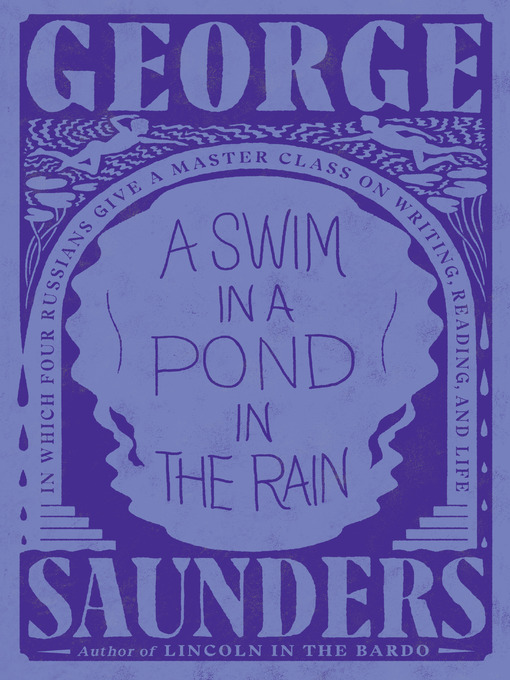
A Swim in a Pond in the Rain
In Which Four Russians Give a Master Class on Writing, Reading, and Life
- اطلاعات
- نقد و بررسی
- دیدگاه کاربران
نقد و بررسی

December 15, 2020
How did Saunders, who first trained as an engineer and labored in oil fields, become a writer recognized with a Man Booker Prize and MacArthur and Guggenheim fellowships? In great part by reading the masters, especially the giants of nineteenth-century Russia's "resistance literature." So important to Saunders are the stories of Chekhov, Gogol, Tolstoy, and Turgenev, he's been teaching them to MFA students at Syracuse University, his alma mater, for more than two decades. Admirers of Lincoln in the Bardo (2017) and Saunders' equally imaginative short story collections will discover the full scope of his passion for and knowledge of literature in his deeply inquisitive, candid, funny, and philosophical analysis of seven stories, each included here, by his Russian mentors. Saunders discusses each story's structure, energy flow, the questions it raises, and how "meaning is made," embracing both technical finesse and the mysteries at creation's core, writing, "That's what craft is: A way to open ourselves up to the suprapersonal wisdom within us." He also shares his own experiences as a novice writer and explicates his view of fiction as a ""vital moral-ethical tool."" An invaluable and uniquely pleasurable master course and a generous celebration of reading, writing, and all the ways literature enriches our lives.
COPYRIGHT(2020) Booklist, ALL RIGHTS RESERVED.

Starred review from December 21, 2020
Saunders (Lincoln in the Bardo) offers lessons from his graduate-level seminar on the Russian short story in this superb mix of instruction and literary criticism. In surveying seven stories by Anton Chekhov, Ivan Turgenev, Leo Tolstoy, and Nikolai Gogol, Saunders concludes that the secret to crafting powerful fiction is, “Always be escalating. That’s all a story is, really: a continual system of escalation.” Each story is presented in full, along with Saunders’s commentary: on Chekhov’s “In the Cart,” Saunders asks, “why we keep reading a story,” and on Tolstoy’s “Master and Man,” he writes that facts can “draw us in” when the “language isn’t particularly elevated or poetic.” Saunders’s teaching style, much like his fiction, is thoughtful with touches of whimsy, as when he breaks the action of Turgenev’s “The Singers” into a table and compares the short story writer to a roller-coaster designer. The writing advice, meanwhile, is expansive: revising, he writes, involves intuition, and he views a story as a conversation. His closing note for writers is to “go forth and do what you please.” Saunders’s generous teachings—and the classics they’re based on—are sure to please.

January 15, 2021
The renowned author delivers a master class on the Russian short story and on the timeless value of fiction. Though Saunders is known mainly as an inventive, award-winning writer--of novels, short stories, cultural criticism--he has also taught creative writing at Syracuse since 1997. "Some of the best moments of my life...have been spent teaching that Russian class," he writes. This is the book version of that class, illuminating seven stories by the masters: three by Chekhov, two by Tolstoy, and one each by Turgenev and Gogol. All stories are included in full, and readers need not be familiar with Russian literature to find this plan richly rewarding. Opening with Chekhov's "The Cart," Saunders shows just how closely we'll be reading--a page or two of the original text at a time followed by multiple pages of commentary. The author seeks to answer "the million-dollar question: What makes a reader keep reading?" As he shows throughout this thrilling literary lesson, the answer has little to do with conventional notions of theme and plot; it's more about energy, efficiency, intentionality, and other "details of internal dynamics." Saunders explains how what might seem like flaws often work in the story's favor and how we love some stories even more because of--rather than in spite of--those flaws. Saunders is always careful not to confuse the internal workings of a story with authorial intent. Once we become accustomed to reading like he reads, we proceed through the stories with great joy, anticipating even further delights with his explications to follow. "The resistance in the stories," he writes, "is quiet, at a slant, and comes from perhaps the most radical idea of all: that every human being is worthy of attention and that the origins of every good and evil capability of the universe may be found by observing a single, even very humble, person and the turnings of his or her mind." A master of contemporary fiction joyously assesses some of the best of the 19th century.
COPYRIGHT(2021) Kirkus Reviews, ALL RIGHTS RESERVED.

February 19, 2021
Best-selling author Saunders (Lincoln in the Bardo; Tenth of December: Stories) presents a version of a class on Russian short stories that he has taught at Syracuse University to classes of the best young writers in the United States, limited to six students at a time. The book contains the texts of meticulously constructed stories by Anton Chekhov, Ivan Turgenev, Leo Tolstoy, and Nikolai Gogol, written between 1836 and 1905 during a Russian artistic renaissance, shortly before what Saunders calls "one of the bloodiest, most irrational periods in human history." The book's title is taken from one of Chekhov's works in this collection. Saunders defines a story as "a series of things that happen in sequence, in which we can discern a pattern of causality," and in which everything must serve a purpose. Each story is followed by a detailed analysis and commentary. The book, the author notes, is not intended as a "how-to" for others, but rather offers reflections on how he works. Others, he says, must determine for themselves what works best for them. VERDICT Recommended for readers as well as writers interested in how short fiction works and why it is relevant in turbulent times.--Denise J. Stankovics, Vernon, CT
Copyright 2021 Library Journal, LLC Used with permission.




دیدگاه کاربران